Session 2008/2009
Second Report
COMMITTEE ON PROCEDURES
Written Ministerial Statements
Together with the Minutes of Proceedings of the Committee relating
to the Report, Written Submissions, and the Minutes of Evidence
Ordered by The Committee on Procedures to be printed 3 February 2009
Report: 25/08/09R Committee on Procedures
This document is available in a range of alternative formats.
For more information please contact the
Northern Ireland Assembly, Printed Paper Office,
Parliament Buildings, Stormont, Belfast, BT4 3XX
Tel: 028 9052 1078
Committee on Procedures
Membership and Powers
Powers
The Committee on Procedures is a Standing Committee of the Northern Ireland Assembly established in accordance with paragraph 10 of Strand One of the Belfast Agreement and under Assembly Standing Order 54. The Committee has 11 Members including a Chairperson and Deputy Chairperson and a quorum of 5.
The Committee has the power to:
- Consider and review on an ongoing basis the Standing Orders and procedures of the Assembly;
- Initiate inquiries and publish reports;
- Update the Standing Orders of the Assembly for punctuation and grammar; and
- Annually republish Standing Orders
Membership
The Committee first met on 16 May 2007.
The Membership of the Committee since its establishment on 9 May 2007 has been as follows:
- Lord Morrow (Chairman)
- Mr Mervyn Storey (Deputy Chairman)
- Mr Francie Brolly
- Lord Browne
- Mr Mickey Brady*
- Mr Raymond McCartney
- Mr David McClarty
- Mr Adrian McQuillan
- Mr Sean Neeson
- Mr Declan O’Loan
- Mr Ken Robinson
* Mr Mickey Brady replaced Mr Willie Clarke as of 20 May 2008.
Written Ministerial Statements
The Committee on Procedures has provided this report to inform members of its consideration on written Ministerial statements and to provide background information for the future debate on the proposed amendments to Standing Order 18 which will allow for written Ministerial Statements.
Background
In a letter to the Speaker of 29 May 2007, the Executive, through the offices of First Minister and deputy First Minister (OFMDFM), asked that the Assembly’s Standing Orders allow for written statements. The Speaker forwarded this letter to the Committee on Procedures for consideration.
The Assembly’s Standing Orders provide for oral statements to be made by Ministers followed by up to one hour of questions by members. However, the oral and written evidence provided by the Office of First Minister and deputy First Minster indicated that there are
“likely to be occasions when the Executive and individual Ministers will wish to bring matters to the attention of the Assembly which by their nature may not require the same degree of direct Ministerial involvement or time commitment as an oral statement.”
(Letter from First Minister and deputy First Minister, 29 May 2007)
It was suggested that such matters could be dealt with by the provision of a facility for written Ministerial statements.
The Committee Approach
The Committee received an oral briefing from department officials on 27 June 2007 to explore the request in further detail. In addition, the Committee requested additional written information which was received on 28 September 2007 and 22 January 2008.
As well as asking the Speaker and Business Committee to provide a view on written Ministerial statements, the Committee commissioned comparative research and members of the Committee consulted with and reported back on party positions.
In both oral evidence and written submissions to the Committee an undertaking was given by OFMDFM that written statements would not be used as an alternative to oral statements and would be used only in certain circumstances such as –
- advising the Assembly of Executive decisions which may need to be made public before the next Assembly sitting;
- launch of policy consultations or legislative proposals;
- the outcome of consultation exercises;
- the intention of Ministers to make visits outside Northern Ireland;
- publications of departmental and agency reports or corporate / business plans; and
- announcements of some public appointments.
After further and detailed consideration, the Committee agreed that the facility for written Ministerial statements would be a useful mechanism, particularly as it could be used by Ministers during recess. The Committee considered that allowing for written Ministerial Statements would significantly increase the range and frequency of information available to members.
The Committee agreed to bring forward an amendment to Standing Orders to allow for written Ministerial statements at its meeting on 16 April 2008. The Committee noted that it was commencing work on a review of Standing Orders 18 which governed oral statements. As it was likely that this review would lead to further amendments, it was decided to bring forward the amendment for written Ministerial statements and oral statements at the same time.
Appendix 1
Wednesday 13 June 2007
Room 152, Parliament Buildings
Present: Mr Mervyn Storey (Deputy Chairperson)
Mr Francie Brolly
Lord Browne
Mr Willie Clarke
Mr Raymond McCartney
Mr David McClarty
Mr Adrian McQuillan
Mr Declan O’Loan
Mr Ken Robinson
In attendance: Stella McArdle (Clerk)
Elaine Farrell (Assistant Clerk)
Linda Hare (Clerical Supervisor)
The meeting opened in public session at 2.01 p.m.
5. Standing Orders
(a) Ministerial Statements
Following receipt of a letter from OFMDFM in relation to the possibility of amending Standing Orders to allow Ministers to bring matters to the attention of the Assembly by way of a written Ministerial Statement, Members agreed to invite Officials from OFMDFM to the meeting on 27 June 2007 to explain Ministerial Statements in more detail.
Mr Willie Clarke arrived at 2.08 p.m.
Mr David McClarty arrived at 2.09 p.m.
Members also agreed that the Business Committee and Party Whips should be consulted on this issue. Mr Declan O’Loan suggested that consideration should be given to including written Ministerial Statements in the Order Paper.
Action: Clerk
Lord Morrow
Chairperson, Committee on Procedures
Wednesday 27 June 2007
Room 152, Parliament Buildings
Present: Lord Morrow (Chairperson)
Mr Mervyn Storey (Deputy Chairperson)
Mr Francie Brolly
Lord Browne
Mr Raymond McCartney
Mr David McClarty
Mr Adrian McQuillan
Mr Sean Neeson
Mr Declan O’Loan
Mr Ken Robinson
In attendance: Stella McArdle (Clerk)
Elaine Farrell (Assistant Clerk)
Laura Wilson (Clerical Officer)
The meeting opened in public session at 2.01 p.m.
1. Apologies
There were no apologies noted.
2. Standing Orders
(a) Ministerial Statements – Briefing from officials from OFMDFM
Committee Members were briefed by Mrs Rosalie Flanagan, Director, Executive Services Directorate, Mr Neill Jackson, Head of Machinery of Government and Mr Alan Rogers, Head of Assembly Section, Machinery of Government. A question and answer session ensued.
Mrs Rosalie Flanagan agreed to take a number of issues back to the Executive for response to the Committee.
Agreed: Members agreed that any further issues would be put to OFMDFM in writing and a response requested.
The Chairperson thanked the officials for their information briefing.
The briefing ended at 2.39 p.m.
Agreed: Members agreed to consult with Party Whips regarding Written Ministerial Statements and forward comments back to Committee staff.
Lord Morrow
Chairperson, Committee on Procedures
Wednesday 5 September 2007
Room 152, Parliament Buildings
Present: Lord Morrow (Chairperson)
Mr Mervyn Storey (Deputy Chairperson)
Lord Browne
Mr Raymond McCartney
Mr Adrian McQuillan
Mr Sean Neeson
Mr Declan O’Loan
Mr Ken Robinson
In attendance: Stella McArdle (Clerk)
Elaine Farrell (Assistant Clerk)
Linda Hare (Clerical Supervisor)
Apologies: Mr David McClarty
Mr Francie Brolly
The meeting opened in public session at 2.00 p.m.
6. Written Ministerial Statements
Members noted that OFMDFM had agreed to provide some further information to the committee. As this has not been received Members agreed to defer this issue.
Agreed: Members agreed to consult with their parties to ensure that their views were considered.
Lord Morrow
Chairperson, Committee on Procedures
Wednesday 17 October 2007
Room 135, Parliament Buildings
Present: Lord Morrow (Chairperson)
Mr Francie Brolly
Mr David McClarty
Mr Sean Neeson
Mr Declan O’Loan
Mr Ken Robinson
In attendance: Ms Stella McArdle (Clerk)
Mrs Elaine Farrell (Assistant Clerk)
Ms Linda Hare (Clerical Supervisor)
Apologies: Lord Browne
Mr Adrian McQuillan
The meeting opened in public session at 2.04 p.m.
7. Ministerial Statements
The Committee noted the response from OFMDFM regarding a number of outstanding issues relating to their appearance at a Committee meeting on 27 June 2007.
Agreed: The Committee agreed to write to OFMDFM to seek further clarification on the draft guidance for Ministers and additional information regarding the publication scheme.
Agreed: The Committee agreed that the Standing Order on Statements should be given some consideration.
Lord Morrow
Chairperson, Committee on Procedures
Wednesday 28 November 2007
Room 152, Parliament Buildings
Present: Lord Morrow (Chairperson)
Mr Mervyn Storey (Deputy Chairperson)
Lord Browne
Mr Willie Clarke
Mr Adrian McQuillan
Mr Sean Neeson
Mr Declan O’Loan
In attendance: Ms Stella McArdle (Clerk)
Mrs Elaine Farrell (Assistant Clerk)
Ms Linda Hare (Clerical Supervisor)
Apologies: Mr Raymond McCartney
Mr Ken Robinson
The meeting opened in closed session at 2.02 p.m.
The meeting went into public session at 2.33 p.m.
5. Ministerial Statements
The Committee discussed issues concerns outlined by the Business Committee in relation to Ministerial Statements.
Agreed: The Committee agreed that Ministerial Statements should be available to Members at least 30 minutes in advance, that the Speaker should be consulted to determine if the notice given to him is adequate.
Agreed: That more information should be sought regarding a debate on a statement.
Agreed: That further information should be requested from OFMDFM on Ministerial Guidance to cover written ministerial statements.
Lord Morrow
Chairperson, Committee on Procedures
Wednesday, 16 April 2008
Room 152, Parliament Buildings
Present: Lord Morrow (Chairperson)
Mr Mervyn Storey (Deputy Chairperson)
Mr Francie Brolly
Lord Wallace Browne
Mr David McClarty
Mr Adrian McQuillan
Mr Declan O’Loan
Mr Ken Robinson
In Attendance: Ms Stella McArdle (Assembly Clerk)
Ms Wendy Young (Assistant Assembly Clerk)
Ms Linda Hare (Clerical Supervisor)
Ms Gwyneth Deconink (Clerical Officer)
Apologies: Mr Sean Neeson Mr Willie Clark
The meeting opened at 2.03pm in public session.
5. Written Ministerial Statements
The Committee discussed the issue of Written Ministerial Statements.
Agreed: The Committee agreed to allow for Written Ministerial Statements.
Agreed: The Committee agreed to defer changes to Standing Orders allowing for Written Ministerial Statements until making changes to the Standing Order 18 – Statements.
Agreed: The Committee agreed to write to the First Minister and Deputy First Minister to inform them of the Committee’s decision.
Lord Morrow
Chairperson, Committee for Procedures.
Tuesday, 6 January 2009
Room 144, Parliament Buildings
Present: Lord Morrow (Chairperson)
Mr Mickey Brady
Mr Francie Brolly
Lord Wallace Browne
Mr Raymond McCartney
Mr Sean Neeson
Mr Declan O’Loan
Mr Ken Robinson
In Attendance: Ms Stella McArdle (Assembly Clerk)
Mr Jim Beatty (Assistant Assembly Clerk)
Ms Linda Hare (Clerical Supervisor)
Mr Diarmaid Elder (Clerical Officer)
Apologies: Mr Mervyn Storey (Deputy Chairperson)
Mr David McClarty
Mr Adrian McQuillan
The meeting opened at 2.34 pm in closed session.
The meeting moved into open session at 3.01pm.
9. SO 18 – Ministerial Statements
The Committee discussed the earlier presentation session with the Stormont Correspondents Association and considered proposed revisions to the SO.
Agreed: The Committee agreed the way forward on the majority of proposals. Outstanding issues will be discussed at the meeting in February 2009.
Lord Morrow,
Chairperson, Committee on Procedures
Tuesday, 3 February 2009
Room 144, Parliament Buildings
Present: Lord Morrow (Chairperson)
Mr Mervyn Storey (Deputy Chairperson)
Mr Mickey Brady
Mr Francie Brolly
Lord Wallace Browne
Mr Raymond McCartney
Mr David McClarty
Mr Adrian McQuillan
Mr Sean Neeson
Mr Declan O’Loan
Mr Ken Robinson
In Attendance: Ms Stella McArdle (Assembly Clerk)
Mr Jim Beatty (Assistant Assembly Clerk)
Ms Noelle Bourke (Clerical Supervisor)
Mr Diarmaid Elder (Clerical Officer)
Apologies: None
The meeting opened at 2.05pm in closed session.
The meeting moved into open session at 3.15 pm.
6. SO18 Ministerial Statements
The Committee considered a paper on SO18 Ministerial Statements.
Mr McClarty joined the meeting at 4.02pm.
Agreed: The Committee agreed the amendments to the Standing Order. A motion for debate in plenary will be discussed at the meeting on 3 March 2009.
The Committee considered a draft report on Written Ministerial Statements.
Agreed: The draft report was agreed and the Committee ordered it to be printed. It was agreed to embargo the report until 00.01am on Friday, 13 February 2009.
Lord Morrow
Chairperson, Committee on Procedures
Appendix 2
27 June 2007
Members present for all or part of the proceedings:
Lord Morrow (Chairperson)
Mr Mervyn Storey (Deputy Chairperson)
Mr Francie Brolly
Lord Browne
Mr Raymond McCartney
Mr David McClarty
Mr Adrian McQuillan
Mr Sean Neeson
Mr Declan O’Loan
Mr Ken Robinson
Witnesses:
Mrs Rosalie Flanagan |
OFMDFM |
1. The Chairperson (Lord Morrow): I welcome from the Office of the First Minister and the Deputy First Minister Mrs Rosalie Flanagan, director of executive services directorate; Mr Neill Jackson, head of machinery of government division; and Mr Alan Rogers, head of Assembly section in that division. We look forward to your 10-minute presentation. After that, members of the Committee may wish to ask some questions by way of further explanation. Are you content with that?
2. Mrs Rosalie Flanagan (Office of the First Minister and the Deputy First Minister (OFMDFM)): Thank you for inviting us today. We are happy to explain some of the thinking behind the proposal from the First Minister and Deputy First Minister that the Assembly should consider the introduction of a facility for Ministers to make written statements to the Assembly. My colleagues Neill Jackson and Alan Rogers are here to support me.
3. Last week we made a written submission to the Committee on Procedures outlining the proposals. I assure the Committee that the proposal — and its intention — is not in any way to be used to circumvent the current arrangements for Ministers to make oral statements; to appear in the Chamber; and to answer questions — as they did several times during the previous period of devolution, and have done since 8 May 2007.
4. At their first meeting the Executive were very clear — and it was clearly agreed around the table — that they wanted to give the Assembly its proper place and, as far as possible, to advise the Assembly of decisions before they were made public.
5. In thinking about how to put that commitment into practice, we considered the potential of written ministerial statements. For example, at the Executive’s first meeting on 10 May 2007, they took the significant decision not to impose water charges this year. There was a high level of public interest in the decision, and it would not have been possible to defer the announcement because the media had gathered outside to hear it.
6. However, the Executive recognised the importance of giving the Assembly its place. In the absence of any other system of communication at that time, a letter was written to the Speaker and copied to all Members and to the Chairpersons of the Regional Development Committee and the Finance and Personnel Committee. That was the best that the Executive could do to give the Assembly its place.
7. On further consideration, we thought that there was a broader issue and that Ministers might want to advise the Assembly directly on other categories of information, perhaps in situations in which it would be inappropriate and unnecessary to have the level of questions and answers usual after oral statements. Rather, written ministerial statements would simply provide information to the Assembly.
8. To summarise, written ministerial statements would allow Ministers to provide information to the Assembly without delaying until they can make an oral statement at the next plenary sitting. That applies particularly to meetings of the Executive, which are currently held on Thursday afternoons. From time to time the gap between the Executive making decisions on a Thursday and the next plenary sitting the following Monday may be an issue. A written ministerial statement might also be used to publish documents, such as departmental or agency reports, corporate business plans, the announcement of public appointments or Ministers’ intentions to visit other countries.
9. Some of the thinking in the machinery of Government division has been informed by considering what happens elsewhere. At Westminster, there is no regular, or general, provision for oral statements, although some are made about major issues, such as the war in Iraq. However, there is a provision for written ministerial statements, which Ministers use extensively to inform MPs and peers in both Houses of important announcements and which are published in the daily volumes of Hansard — the Official Report.
10. The Welsh Assembly has provision for oral and written statements, both of which are published in its Record of Proceedings. The Scottish Parliament uses a different system of inspired parliamentary questions. The Northern Ireland Assembly could adopt such a system, but we did not go down that route because we considered the written ministerial statement to be more open, transparent and upfront. It also has the merit that it can be made without any delay, unlike an inspired parliamentary question, which requires a delay between tabling and response.
11. At Westminster, there is no Standing Order that deals with written ministerial statements. It is simply an administrative procedure through which Ministers submit their written statements for publication in Hansard. We understand that that system could be introduced in the Assembly through an amendment to Standing Orders.
12. At the Committee’s request — and with some temerity — our written submission includes possible wording for a Standing Order to cover that. However, further consideration will be required once discussions on the handling of the ministerial statements have been concluded.
13. The important feature of the written ministerial statement would be that it would appear in Hansard, the Official Report of the Northern Ireland Assembly. That would notify the Assembly of its contents and put the matter into the public domain. However, in these days of electronic communication, we should also consider email as a way of getting information directly and quickly to Members. OFMDFM will be happy to work with the Committee on that issue.
14. We quite understand that people may think that a written ministerial statement is a way of trying to circumvent or avoid oral statements in the Assembly; however, I assure the Committee that that is not the rationale behind the proposal. Ministers are keen to make oral statements on appropriate matters to the Assembly, and to answer questions and be accountable to the Assembly as they have been up to now. The Executive are seized of the situation. It is early days yet; it is just seven weeks since devolution, and there have been several oral statements in the House. Government policy is still under development. After recess, I expect that more regular oral statements will be made on a range of matters.
15. Our main purpose is to be helpful. We are happy to discuss, in any level of detail, how written ministerial statements would be handled in practice. I shall be happy to bring back to the First Minister and the Deputy First Minister and the Executive any queries or thoughts on which the Committee would like further clarification or elucidation.
16. The Chairperson: Mrs Flanagan, you mentioned the gap between Executive meetings on Thursdays and Assembly sittings on Mondays. I am concerned that that leaves a three-day period during which the press can have plenty of fun, but Members will not have received the communication. It would not be healthy to have a situation where Members have to read newspapers in order to find out what is going on. We need a cast iron guarantee that that will not happen.
17. You also mentioned that there is not a facility for inspired questions.
18. Mrs Flanagan: I did not say that exactly. Inspired questions are a traditional way of describing a method that some other legislatures and Administrations use to get information into the public domain. Presumably, it is possible for any question to be put down by a Member.
19. The Chairperson: So that facility exists.
20. Mrs Flanagan: Yes, it does.
21. The Chairperson: I do not want to misunderstand or misquote you. Did you say that there is a facility for inspired questions or that there is not a facility?
22. Mrs Flanagan: I do not think that I said either. Inspired questions are one method for a Minister to get information into the Assembly and, hence, the public domain. However, we think that the method of written ministerial statement is preferable. It is more direct and immediate; it is more open and transparent. When a question for written answer is submitted to a Minister, an answer goes to the Member who asked the question and, not so immediately, to other Members. A written ministerial statement would ensure a faster response.
23. The Chairperson: Have you any ideas as to the mechanism that would trigger that?
24. Do you envisage that certain statements from the Executive would not be made in that way?
25. Mrs Flanagan: Not released as written ministerial statements?
26. The Chairperson: Yes.
27. Mrs Flanagan: Oral statements will continue to be made. On Monday of this week, the Minister of Finance and Personnel made a statement on the outcome of the June monitoring round, which was followed by questions. Any statement that is made orally under current Standing Orders will continue to be made in that way. The proposed procedure offers a facility for making additional or immediate statements and might be used when the Assembly is not sitting in plenary session.
28. By way of example, when the flooding emergency occurred a couple of weeks ago, certain decisions were taken, including one to make up to £5 million of additional funding available to help people whose households were damaged and who were in hardship. A further decision was taken to introduce an emergency scheme allowing households in those circumstances a payment of £1,000. Both of those decisions were taken in response to an emergency situation.
29. I have not discussed this with Ministers or with the Executive — but had the facility for written statements then existed, I imagine that the Assembly could have been notified of those decisions on Thursday, Friday or over that weekend. As it happened, the Minister for Regional Development made an oral statement to the Assembly on behalf of all the relevant Ministers the following Monday. That was the first opportunity that he and other Ministers had to inform the Assembly of those decisions, and he answered questions and dealt with the issues in more detail. That illustrates one set of circumstances in which the procedure might be followed.
30. Mr Storey: I welcome the delegation. I also wish to ask about the mechanics and trigger mechanisms of the procedure. How does one determine whether a matter is sufficiently weighty to merit a written statement, as opposed to an oral one? Would an initial written statement lead to a subsequent oral one, as in the case that has been outlined?
31. In the examples of the flooding emergency and the announcement of the terms of reference for the review of the domestic rating system, each was the subject of an oral statement in the House. It may not be a question of choosing between a written statement and an oral one; a combination of both might be necessary.
32. I am also uncertain about how the timing of statements would be determined. The Executive meets on Thursdays, so how would Members of the Assembly receive notification? How would such a statement be laid before the House? Would it be put before the Speaker, and then issued? Other communications that are made over the weekend are placed in Members’ pigeonholes, and there they stay until Monday morning. By that time, the world and its granny probably knows what is taking place.
33. Mrs Flanagan: You are quite right; I had intended to make that point. I envisage that a developing situation might necessitate a written statement to release certain information at an appropriate time. That would have to be followed by an oral statement, made when the issue had received adequate consideration and certain decisions had been taken or proposals made. The flooding emergency was such an issue. In other circumstances, issues might develop over a longer period.
34. The Executive have not yet considered in detail the precise demarcation between what should be dealt with by written statement and what should be dealt with by oral statement. At present, the plan for written statements is a proposal for the Assembly. We will have to consider what guidance should be given on the detail of that. There is no suggestion that the procedure is designed to avoid oral statements being made in appropriate circumstances.
35. In relation to the second point, it is not the intention of the Executive that every decision taken would be immediately notified to the Assembly on Thursday evening or Friday morning by written statement. It would be a facility that would be there for matters that were inevitably going to become public, perhaps because of high media or public interest, because of an emergency, or in response to a crisis or criticism. For example, the review of domestic rates and the outcome of the June monitoring round were considered by the Executive, but were not discussed with the press, and were not in the public domain until a public oral statement was made in the Assembly. Therefore, this facility would be a safeguard, to fall back on when it might be difficult to keep an issue out of the public domain over the weekend.
36. We have considered the issue of how information reaches Members. Email is one possibility. The method of passing information to Members is a matter for the Assembly to decide. However, we are happy to facilitate anything that is thought to be helpful.
37. Mr O’Loan: It is important to reiterate that the single biggest issue is the concern that any new method of communication not be used as a substitute for oral statements, when there is the opportunity for Members to ask questions. I should be very surprised if all Members did not share that view.
38. Is it envisaged that these written statements would come only at short notice, or would there be notice of them on the Order Paper? It might be thought that I am going off at a tangent, but I do not fully understand the procedures. It was known for several days that the Minister of Finance and Personnel would be making a statement on Monday, but it did not appear on the Order Paper. As a Member, I should find it helpful if notice of the intention to make such a statement were to appear on the Order Paper.
39. Is it envisaged that such statements would be made only at short notice? If so, they could not appear on the Order Paper. Is there an intention to continue to issue the written statements during recess? How then would they be communicated to Members?
40. The Chairperson: Before you answer that, Mrs Flanagan, I ask that all Members ensure that their mobiles are switched off, as it interferes with the transmission for Hansard. Thank you.
41. Mrs Flanagan: Whether notice is given of the statement depends on the nature of the subject. If a matter has arisen recently and must be commented on quickly, then there is no possibility of giving notice. On the other hand, we can consider putting a process in place that would allow notice to be given of a written statement making a routine announcement to the Assembly, for example, on something such as the publication of a consultation document.
42. In cases where we knew before the Thursday deadline that an oral statement would be made, we would advise accordingly and it could appear on the Order Paper if the Assembly wished. However, if it is a decision taken by the Executive late on Thursday afternoon, the timing does not mesh together, and that is why they cannot appear on the Order Paper. It is not a matter of principle that a decision is taken not to include oral statements on the Order Paper.
43. What would happen during recess is an issue that we need to consider. We are mindful of the point about sending information to Members when they might not be here, but that is an issue at the moment anyway because there is currently no opportunity, whether by oral statement or otherwise, to notify Members of anything during recess. It is certainly possible that written statements could be used during recess to fill the gap that currently exists. I am sure that Ministers and the Executive will be happy to consider that issue, but they have not discussed it so far.
44. The Chairperson: That is a salient and important point.
45. Mrs Flanagan: There is a gap at the moment.
46. Mr McQuillan: As far as I know, Ministers were not able to issue written statements during the previous Assembly mandate. What is so different about this Assembly that we now require such a procedure, which was not required before?
47. The Chairperson: I will answer that. The previous Executive released statements to the public before they were released to the Assembly. To say that that caused a row would be an understatement.
48. Mrs Flanagan: Written statements were not released during the previous Assembly because there was no provision for it in Standing Orders. The only route was to make an oral statement on a Monday or Tuesday when the Assembly was in plenary session.
49. As the Chairperson said, Ministers sometimes made statements to the press before they were made to the Assembly. However, that is almost a separate issue from the matter of whether we should publish written statements, because the kind of business to which we are referring — I cannot think of an example at the moment — would probably more properly have been discussed as part of an oral statement.
50. An example of something that could best be announced in a written statement is the Executive’s first decision, which was the decision not to impose water charges this year. We did the best that we could to get that information to Assembly Members by placing letters in their pigeonholes and by sending letters to the Speaker and the relevant Committee Chairpersons. The Executive are trying to fill a gap that they have recognised. We almost had to make up a procedure to fill that gap on the evening of 10 May.
51. The Chairperson: Can you research what happened during the previous Assembly mandate? I am clear that the previous Executive made statements to the public before they were ever made to the House, and that Members heard them in the public domain before they were made aware of them in the Assembly. I have no doubt about that. Can you carry out research to bring to our attention the number of times that that happened during the previous Assembly?
52. Mrs Flanagan: I suppose that the matter is a bit subjective. If such issues are recorded in particular aspects of Assembly business, we could certainly look that up. I am not trying to avoid the question, and I am loath to speak on Ministers’ behalf without having consulted them, but if Ministers were here, I think that they would say that this is a new Executive that has taken a clear stand on the issue. I think that the intention is to give the Assembly its place. The letter that the Executive issued to Members on 10 May made that point clearly.
53. I am happy to look back at what happened previously if the Committee thinks that helpful, but I think that Ministers would probably prefer to look forward.
54. The Chairperson: It is good to draw on the experience of history, too.
55. Mr K Robinson: Given that some of our current Ministers were Ministers in the previous Administration, and might have slipped into bad habits during that period, it is vital that we have a clear definition of how Ministers should approach the issue. I think that all Members suspect that, given the opportunity, Ministers will try to outflank them. That is the way of human nature.
56. Given the previous experience to which the Chairperson referred, and given that some of the same personnel are involved, some Ministers might — I will not say that they will slip into their bad old ways — be tempted to repeat their previous approach to such statements. It is vital that we quantify the matter now and lay down a firm framework, in the interests both of Ministers and of the Assembly. We want to streamline the business, but we all want the primacy of the Assembly to be protected.
57. Mrs Flanagan: I am very happy to bring that point to the attention of the Executive. I shall get back to the Committee in due course.
58. Mr McCartney: My point follows Ken’s point about ministerial statements. To address Members’ fears about sleight of hand — or whatever one wants to call it — might a safeguard mechanism be introduced to ensure that a written statement could be followed by an oral statement? In other words, if the Assembly felt that a written statement was not appropriate, it could reserve the right to call a Minister to make an oral statement to the House on the same matter. Can that be considered?
59. Mrs Flanagan: If the Assembly wants to adopt such a mechanism, I am sure that Ministers will be content to respond to it. I will certainly communicate that suggestion to the Executive.
60. Mr Storey: That is a valid argument. If a written statement does not mention that a Minister also intends to make an oral statement on the issue, the Assembly should have some mechanism whereby it can get further clarity on the issue.
61. The Committee may have other questions on this matter. Will it able to forward them to the Office of the First Minister and the Deputy First Minister for consideration?
62. The Chairperson: I will answer that question: the answer is yes, it will. With all due respect to everyone, I suspect that we will not make a decision on this matter today. Members have reservations about this issue. They are nervous about it, and they will want to think it over. The real fear is that procedure could be abused — I can use no other word. The issue will become a matter of who will make the call on whether a statement is issued in written form, delivered orally to the House or released directly to the press. That takes control away from Assembly Members and relegates them to second-class status.
63. Mr Storey: Can the Committee have confirmation of the current procedure for releasing information after the Executive meetings that are held on Thursdays? What is the standard protocol? I know that Members received a letter following the announcement on water charges. I do not think that there will be an Executive meeting this Thursday.
64. Mrs Flanagan: Not this week; Executive meetings are held every other week.
65. Mr Storey: Of course — unless the meeting is to be held in Washington. What is the current protocol for statements detailing what has been discussed at Executive meetings?
66. Mrs Flanagan: The Executive have decided that they will not issue press statements as a matter of course after every Executive meeting. The decision to issue statements will be taken on a meeting-by-meeting basis. In contrast, the previous Executive followed a procedure whereby a statement was issued after every meeting. The present Executive’s approach recognises that they may have discussed matters that they do not want to put into the public domain until a statement has been made in the Assembly at the following week’s plenary meeting.
67. After two of the four Executive meetings thus far, a letter has been sent to the Speaker providing information about some decisions that had been taken. That reflects the fact that there is no alternative route for relaying that information to the Assembly. We recognise that that procedure is not in accordance with any formal procedures that the Assembly has agreed; it is simply the Executive making the effort to do the best that they can to meet protocol requirements.
68. The Chairperson: That ends the question-and-answer session. I thank the witnesses for appearing before the Committee.
Appendix 3
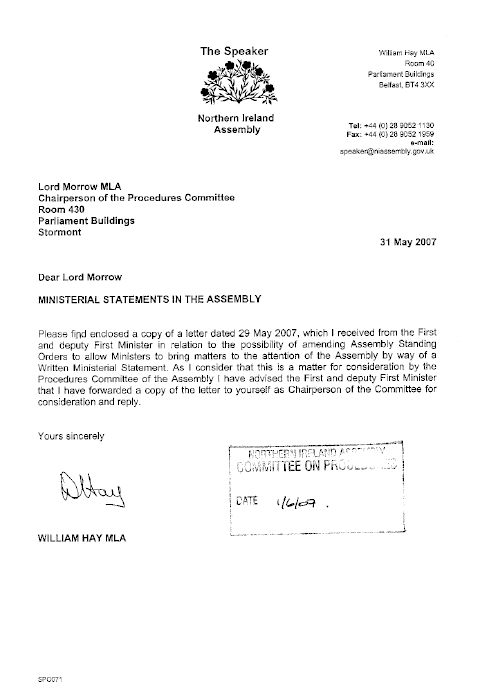
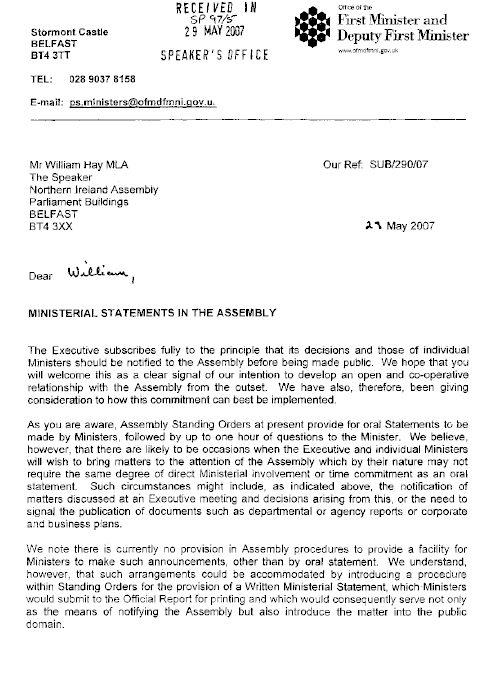
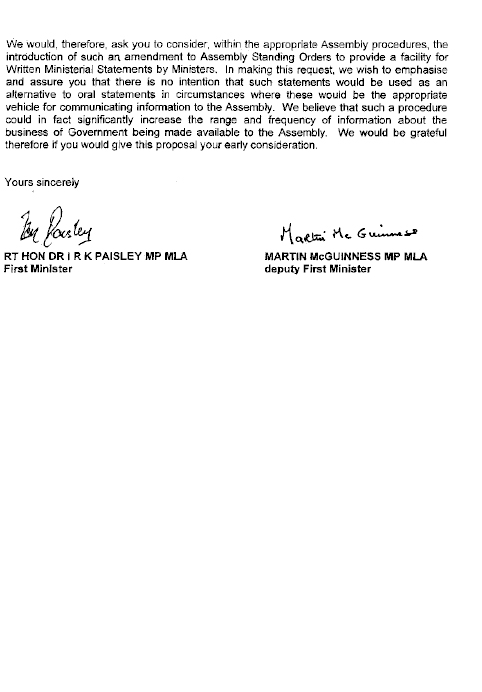
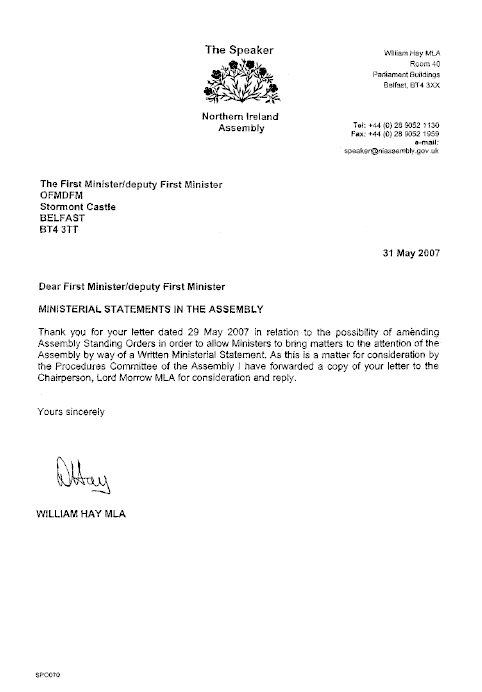
 |
Committee on Procedures |
Mr William Hay MLA
The Speaker
Northern Ireland Assembly
Parliament Buildings
Stormont
BT4 3XX
13 June 2007
Dear William
Thank you for your letter of 31 May 2007 regarding Ministerial Statements in the Assembly.
At it’s meeting today, the Committee on Procedures considered the proposal put forward by the First Minister and deputy First Minister regarding the amendment of Standing Orders in order for Ministers to bring matters to the attention of the Assembly by way of a Written Ministerial Statement. Members from the Committee on Procedures have agreed to progress this matter by asking officials from OFMDFM to come before the Committee on 27 June 2007 and explain in further detail the need and rationale for written Ministerial Statements. The Committee will also explore with OFMDFM what protocol or procedures would be used to ensure important issues are not dealt with by written statement.
The Committee would also like to take the opinion of you as Speaker, and of the Business Committee. To that end, if you and/or the Business Committee have any opinions on this matter, the Committee would be pleased to hear from you in writing. The Committee would appreciate it if you could reply by 22 June 2007.
Yours sincerely
MERVYN STOREY MLA
Deputy Chairperson, Committee on Procedures
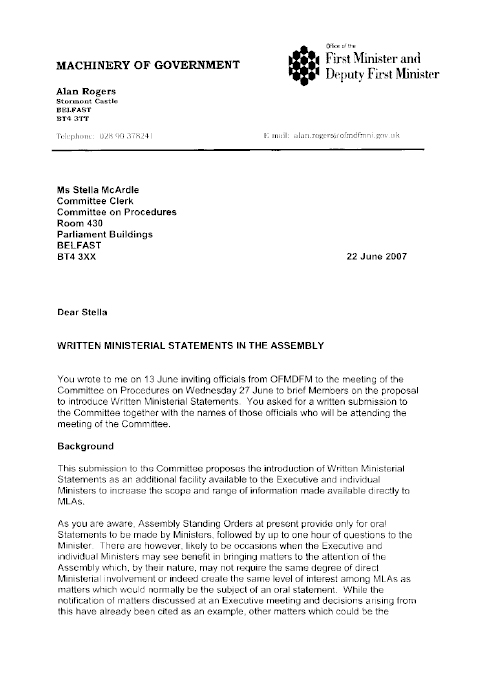
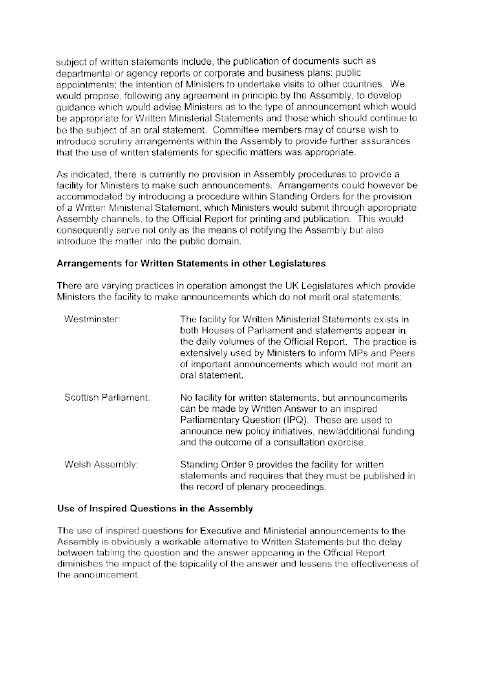
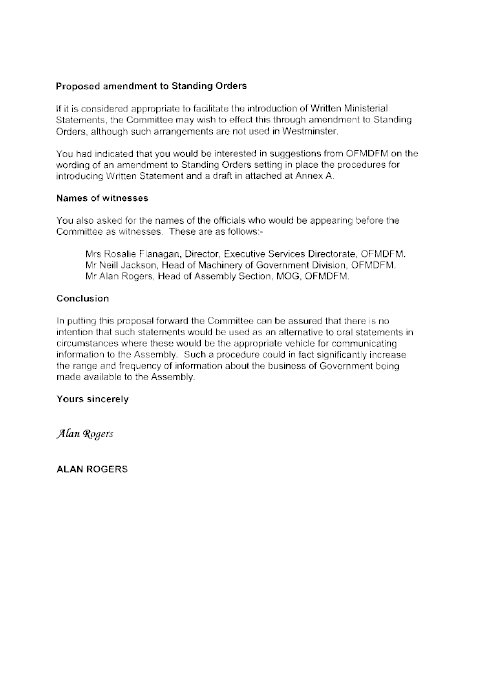
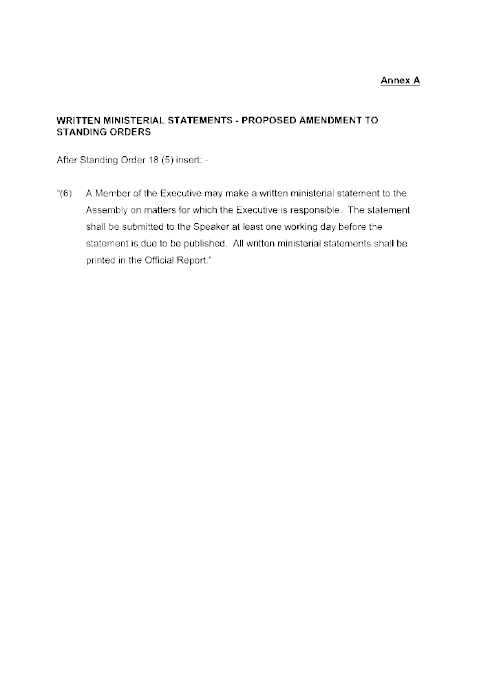
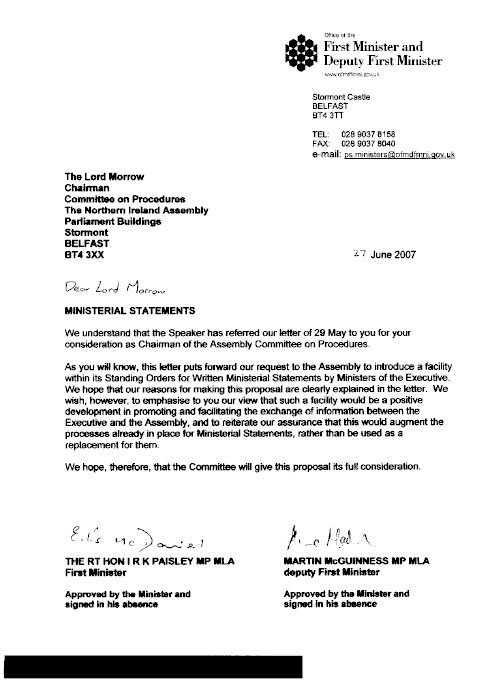
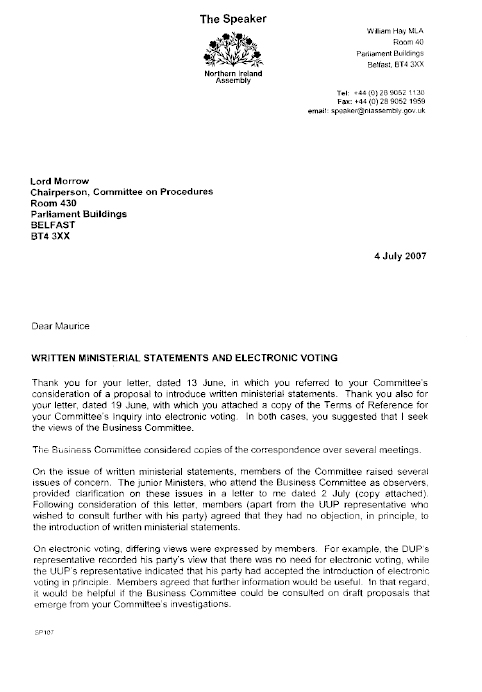
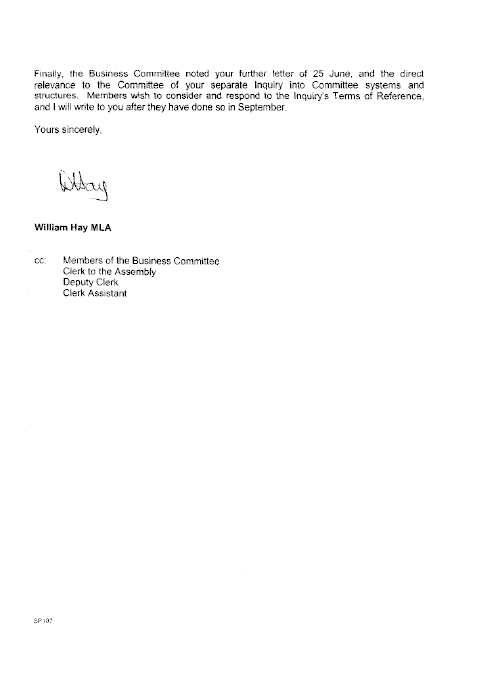

28 September 2007
Ms Elaine Farrell
Assistant Clerk
Committee on Procedures
Room 430
Parliament Buildings
Belfast
BT4 3XX
Dear Elaine
Written Ministerial Statements in The Assembly
You wrote to me on 3 July requesting, on behalf of the Procedures Committee, additional information to that provided by OFMDFM officials in their presentation to the Committee on 27 June. Responses to the information requested are contained in the attached paper. Apologies for the delay in replying.
Yours sincerely
[Signed]
Alan Rogers
Additional Information Requested by Committee on Procedures
Use of Written Ministerial Statements for matters relating to the NSMC and BIC
Under the current statutory obligations of s52 of the Northern Ireland Act, Ministers or Junior Ministers must make an oral report to the Assembly on the outcome of the meetings of either Council. A written report could only be made if Standing Orders of the Assembly were amended to authorise that the report be made in writing.
At the moment therefore the Committee can be assured that Ministers are legally bound to make oral statements to the Assembly. That position will only change if the Assembly decides to change it.
Could Written Ministerial Statements have replaced any of the Oral Statements made to date?
This would have been a matter for individual Ministers and the Executive. However those oral statements that were made were considered both of significance and of sufficient public importance to warrant an oral statement.
Proposed guidance to Ministers
Draft Guidance will be prepared for consideration by the Executive. It is expected that the guidance will emphasise that oral statements should continue to be used for important matters of public interest and that written statements should not be used to avoid making oral statements where appropriate. This should allay any concerns among Committee members about any potential misuse of the facility.
We would be happy of course to consult with the Committee on the terms of the guidance and welcome any comments or observations they may have.
Possible written statements since 8 May 2007
The proposal for the introduction of a facility for Written Ministerial Statements was made because the Executive wished to advise the Assembly immediately of decisions taken at some of its meetings. In the absence of such a facility, the information was provided through letters to the Speaker and, where appropriate, the relevant Committee Chairs. This happened on 5 occasions.
Statements in the previous Assembly
We have noted the Committee’s request for the number of occasions the previous Executive made statements to the public before they were made to the Assembly.
During the period Dec 1999 to Oct 2002, Ministers made over 130 statements to Members in the Assembly and whilst many were followed by Departmental Press Releases, there are no records available to indicate if any such statements were made to the public in advance of delivery to Assembly members.
Extension of Written Statements to include Ministerial visits within NI
Using written statements to advise of all Ministerial visits within Northern Ireland could prove cumbersome, particularly in relation to short outside visits or single events.
There is already a protocol in place whereby the constituency MLAs are informed by Ministers of visits to their constituency and it is considered appropriate for this arrangement to remain as the primary means of communication.
Procedures for informing MLAs and arrangements during Recess
We will work with the Committee and Assembly officials regarding the arrangements for handling written statements, but our initial thoughts are that written statements will need to be published in the Official Report – Hansard – as a means of informing members. As Hansard is presently only published twice a week, ie after each Plenary sitting, other arrangements may have to be put in place to inform Members when statements may not coincide with publication days.
This would obviously fall to the Committee and others in the Assembly to decide on what would be most appropriate, but for example, copies of the statement could be put on the Assembly web site (similar to the practice in the Welsh Assembly), e-mailed to MLAs or copies placed in Members’ pigeon holes. Arrangements could also include notifying the Speaker in advance of publishing a statement.
One further approach could be for the Speaker to announce to Members at each plenary sitting the written statements that he had received the previous week and advise members that these would then be reported in Hansard. The statements could be reproduced in full.
Arrangements to be put in place during Recess would again be for the Assembly to determine, but statements received by the Speaker could continue to be issued to Members by paper mail or e-mail and continue to be posted on the Assembly web site. At the start of the session the Speaker could refer members to the Official Report which will record the statements made during the Recess period.
Machinery of Government Division
OFMDFM
September 2007
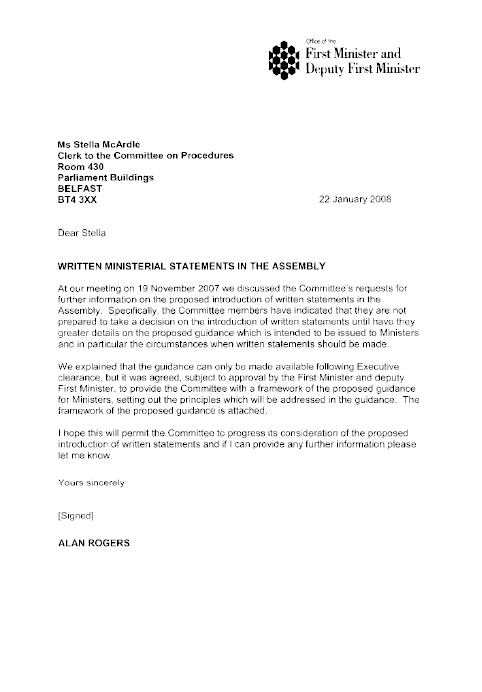
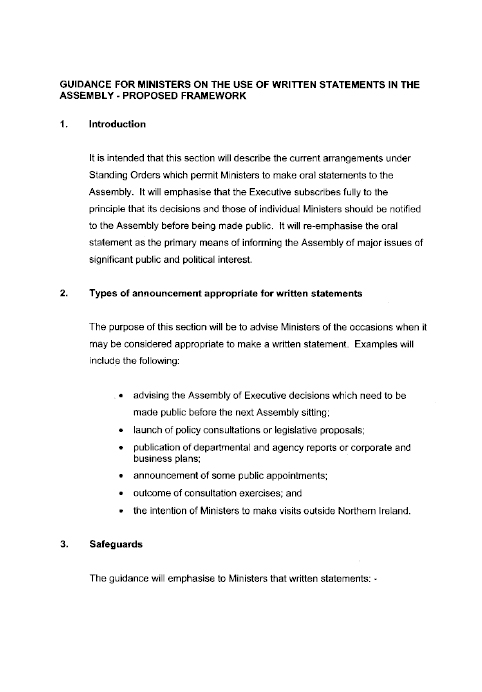
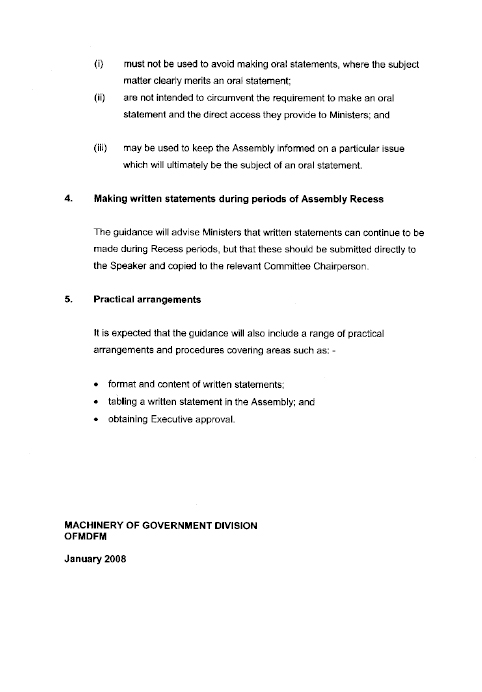
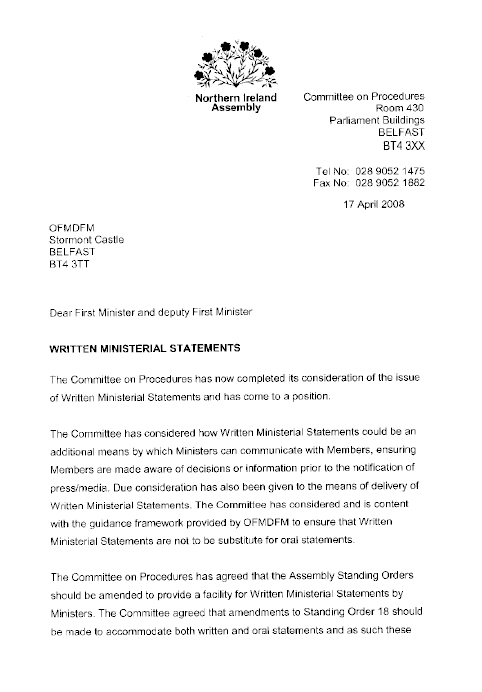
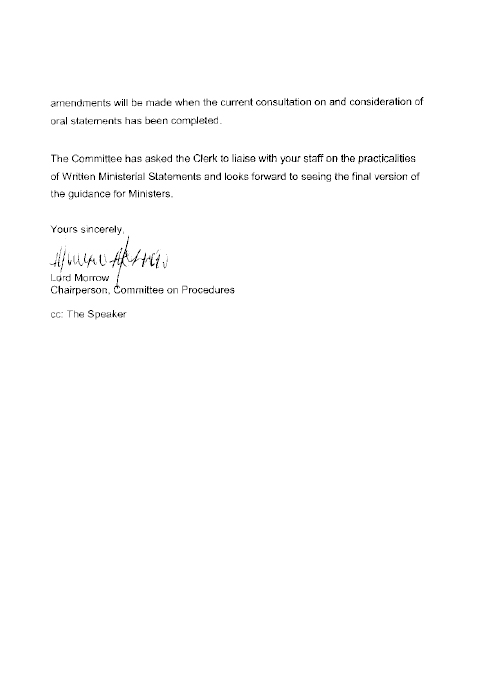
Appendix 4
Research and Library Services
_fmt.jpeg)
Briefing Note:
Comparative analysis of procedures governing Ministerial Statements in Legislative Chambers
23 November 2007
1.0 Introduction
This paper has been prepared for the Committee on Procedures to provide information on the structures and conventions used in legislatures for government Ministers to make statements in the Chamber. Firstly there is a description of the relevant procedures in the Northern Ireland Assembly and then of the House of Commons, the Scottish Parliament, the Welsh Assembly and the Dail. Finally the paper highlights some of the issues surrounding these procedures.
2.0 Definition of Ministerial Statements
A ministerial statement is defined by the Northern Ireland Assembly as a “Statement by a Minister to the Assembly, usually to announce policies and decisions.” 1 It is a method by which the Executive announces departmental policy decisions to the Legislature. Ministerial Statements may also be written statements or oral statements on the floor of the legislative chamber.
3.0 Comparing Ministerial Statements
The basis for comparing the procedures in each of the chosen legislatures is on the details of what the standing orders say, of the notice given prior to a statement, what time is allotted for statements and what the convention and practice is regarding public release of statements and if there are procedures in place for written and oral statements. The findings are summarized in the table below.
Table 1. Practice surrounding Ministerial Statements
Legislature |
Prior Notice for a Statement |
Written and Oral Statements |
Time allowed for Statements |
Release of Statements |
|---|---|---|---|---|
Northern Ireland Assembly |
21/2 hours notice for the speaker. |
Only oral statements. |
No longer than an hour is allowed for questions after the Statement is made. |
No release of statements is allowed prior to being given to members. |
Scottish Parliament |
At least a week in advance but urgent requests can be taken on the same day if the Presiding Officer agrees. |
Only oral statements but written answers can be given to informed statements. |
A 2:1 basis ie. 10 minute statement:20 questions, 15 minute statement:30 minute questions. |
Text of statements can not be released prior to the statement being made. |
House of Commons |
Usually on the day of the statement. |
Both are allowed. |
One hour in total, 10 minutes for statement, 5 minutes for opposition and then questions. |
When the Minister takes his seat before making the statement. |
National Assembly for Wales |
As much as possible but not necessary. |
Both are allowed. |
10 minutes or 1,000 word statements and then questions – all within half an hour. |
Electronic copies go to Members when the minister rises to speak. |
Dail Eireann |
Whips are notified about a week in advance but the Taoiseach can include statements on the day. |
Only oral statements. |
Agreed between the party whips |
Copies are not given to members and pre release to media is against procedure but only by “long standing principal” |
3.1 Northern Ireland
Ministerial statements made in the Northern Ireland Assembly are governed by Standing Order 18 2. This Standing Order obliges Ministers to make statements to the Assembly on matters that arise from their remit within the Executive. The details of the Standing Order are as follows:
- A Minister, where possible, has to provide a written copy of the statement to members as early as possible before delivering the statement. If an early copy of their statement has not been possible, then the Minister will explain to the Assembly why not.
- Copies of Ministerial statements will not be given to the press before being made available to members.
- Notice of a Ministerial Statement will be given to the speaker at least 2½ hours before they are due to be made and the Speaker will inform members when practicable.
- After the Minister gives the statement, a member can move that the statement is noted and then questions can be asked for no longer than an hour under the supervision of the Speaker.
- Statements are to be made outside the time allotted for Questions and Adjournment Debates except if the statement is urgent or relates to the questions or debate, in which case the speaker will allow for the questions and adjournment debate to take place at another time during that week.
There is no Standing Order or procedure which allows for ministers to make written statements to the Assembly. However the Office of the First Minister and Deputy First Minister has put a proposal to the Procedures Committee which would allow Ministers to make written statements for matters which would not merit an oral statement or which can not wait until the next plenary to be announced. The OFMDFM proposal is to amend Standing Orders accordingly and they have provided wording for such an amendment:
Written ministerial statements – proposed amendment to standing orders
After Standing Order 18 (5) insert: -
“(6) A Member of the Executive may make a written ministerial statement to the Assembly on matters for which the Executive is responsible. The statement shall be submitted to the Speaker at least one working day before the statement is due to be published. All written ministerial statements shall be printed in the Official Report.” 3
3.2 Scotland
Standing Order 13.2 of the Scottish Parliament4 governs the procedures for Ministerial Statements in the chamber. The Standing Order points out that the Minister will give notice to the Presiding Officer, who will in turn, notify the Parliamentary Bureau, who will inform members by including notice of the statement in the business programme.
If the issue is urgent the Minister can request that the statement is given on that same day that the Presiding Officer is notified. If the Presiding Officer agrees with the urgency then he/she will alter the daily business to allow for the statement and will notify members of the changes.
The Standing Order also points out that a ministerial statement may be debated. The time allowed for Ministerial Statements works on a 2:1 basis, where if a statement is to be 10 minutes long then questions are allowed for 20 minutes or if a statement is 25 minutes long then the questions will be for 30 minutes.
Rule 13.2 Ministerial statements
1. Where a member of the Scottish Executive or junior Scottish Minister wishes to make a statement to a meeting of the Parliament (“a ministerial statement”), notice shall be given to the Presiding Officer. The Presiding Officer shall then notify the Parliamentary Bureau who shall include notice of the ministerial statement in a business programme. A ministerial statement may be debated.
2. Where a ministerial statement is of an urgent nature, the member of the Scottish Executive or junior Scottish Minister wishing to make the statement may, on giving notice of the statement to the Presiding Officer, request that it be made on that day. If the statement is, in the opinion of the Presiding Officer, sufficiently urgent, he or she shall allow the statement to be made and debated and shall make any necessary alteration to the daily business list. Members shall be notified that any such statement is to be made and of any subsequent alteration to the daily business list.
Regarding the release of statements to the press the guidance states that 5:
The text of Ministerial statements or speeches should not be released in advance of them being made to the Parliament. The topic to be covered, including an outline of the problem or issue that the Executive aims to address, may be disclosed, together with an indication of the sort of approach the Executive may take.
There are no procedures for written statements by Ministers in the Scottish Parliament but there are four other options open to a Minister to make an announcement as well as by Ministerial Statement. These options, listed below, pertain to announcements in order of how important the announcement is:
1. A Ministerial statement to the Parliament
2. An answer to a Parliamentary question lodged for written answer
3. An answer in the Chamber to a Parliamentary question lodged for an oral answer
4. A ministerial announcement during a debate
5. A ministerial statement to a committee of the Parliament 6
The closest approximation to a written statement is for a member to ask an inspired parliamentary question (IPQ) and for the Minister to reply by written answer. This option is normally used to announce new policy initiatives, new funding or the outcome of a consultation exercise.
3.3 House of Commons
Ministerial Statements are allowed in the House of Commons and in the House of Lords. Notice of an oral statement is usually not given until the day it is to be made. Prior notice is necessary but not permission 7. Copies of statements are traditionally only given out when the Minister sits down before making the statement although advance copies are usually given to opposition spokesmen as a courtesy. However the Speaker has asked for this to change. In a letter to Members the Speaker stated that 8:
The first idea, which the Committee might like to revisit, is that statements should be made available in advance to all Members, rather than simply to Opposition front bench spokesmen. Receiving a statement, say, half an hour in advance would enable Members to digest its contents and to put specific questions to the Minister on points of clarification or elucidation, rather than, as often happens at present, rehearse matters already covered in the Minister’s remarks.
This letter was given in Evidence to the Modernisation Committee, however the current practice remains that only the opposition spokesmen receive the statement in advance. Oral statements are made after Question Time (and any urgent questions that may have been allowed) or at 11am on a Friday. Oral statements often address major incidents, policies and government actions. At the end of a statement MPs can respond or question the government Minister on its contents.
One hour is allowed for statements in the House of Commons, with 10 minutes allowed for the statement itself and five minutes for a response by the opposition 9.
Since 2002, Government ministers in Westminster can also make written statements to Parliament. Written ministerial statements are normally used to put the day-to-day business of government on the official record and in the public domain. Until 2002 the government mainly used written answers, as in Scotland, to make statements; by getting a backbench MP to table a written question drafted by the government department.
3.4 Wales
In the National Assembly for Wales, both oral and written statements are acceptable. Standing Order 7 states that statements by a member of the government may be taken at a plenary meeting without notice. If business is taken without notice then the presiding officer must adjust the timetable accordingly. Standing Order 9.6 points out that written statements can be made by “the First Minister, a Welsh Minister or the Counsel General” on any matter “relating to his or her responsibilities”. However this is the extent of the detail on statements in the Welsh Standing Orders.
The procedure governing Ministerial Statements is predominantly laid down in the ministerial code and in guidance from the Presiding Officer. The ministerial code informs ministers that 10:
- The most important announcements of the Assembly’s policy should be made, in the first instance, in the Assembly,
- If the issue is particularly sensitive then an oral statement is desirable,
- As much notice as possible should be given to the Minister for Assembly Business and the Head of the Business Unit indicating; the broad content of the announcement.
- If agreement is given, a draft of the statement with background notes and Question and Answer briefing should be circulated to the Minister for Assembly Business and the Head of the Business Unit as soon as possible,
- The final version should be sent to the Minister for Assembly Business, the Head of the Business Unit and the head of the Plenary Business team as soon as they are available, but not less than 2 hours before the statement is due to be made.
- A copy of the text of any oral statement to be made at the end of Questions should usually be shown to the Opposition Parties Business Managers at least 30 minutes before it is made.
- Electronic copies will be sent to all Members via the Chamber web when the Minister stands to deliver it.
The Presiding Officer’s guidelines on ministerial statements cover a number of other aspects of the procedure and summarised below in a pronouncement by the Presiding Officer:
The Presiding Officer: Before calling on the Minister for Education and Lifelong Learning to make the first ministerial statement of the second Assembly, I would like to make a brief statement on statements to remind Members of guidelines for statements made by Ministers in Plenary sessions. As a rule, statements should be distributed to Members half an hour before their delivery. Lengthy statements should be distributed well in advance, and be followed by a shorter oral statement. That would allow appropriate time for questioning.
In normal circumstances, oral statements should not exceed 1,000 words, or take more than 10 minutes to deliver. I will then invite one speaker from each political group to respond to the statement by presenting a short and succinct preamble before asking a reasonable number of questions. I will then try to call as many Members as possible within the half an hour usually allowed for statements, but I expect those questions and answers to be succinct.
3.5 Dail Eireann
Standing Order 43 of the Dail Eireann lays down that prior notice should be given to the Ceann Comhairle of Ministerial Statements 11:
A member of the Government who has given prior notice to the Ceann Comhairle may make a statement in the House on any matter. No debate shall be permitted on any such statement but further statements may be allowed at the discretion of the Ceann Comhairle from a spokesperson nominated by a Party in Opposition.
The process for making Ministerial Statements is through convention rather than written procedure. Party whips meet on Wednesday afternoons when the Dail is in session to discuss the following week’s business. At this meeting the Government whip will announce that statements are to be made the following week and the subject of the statement. Also at this meeting the whips will decide on the length of time to be given to the statement and given to opposition parties to give statements in reply. The whips will also decide on whether there will be a question and answer session following the statement.
Standing Order 26 also gives the Taoiseach the ability to change the order of business at short notice which allows for ministerial statements to be included 12:
26. (1) Every sitting of the Da´il shall be governed by a printed Order Paper, Paper which shall be prepared under the direction of the Ceann Comhairle.
(2) (a) Subject to paragraph (b) the Taoiseach shall have the right to determine the order in which Government business shall appear on the Order Paper and, by announcement, the order in which it shall be taken each day; and may propose, on motion made without notice, arrangements for sittings and for the taking of such business until such business has been disposed of; save where any such proposal is opposed, the Ceann Comhairle shall permit a brief statement from a representative from each party in opposition and theTaoise ach before heor she puts the question thereon. Provided that where a second or subsequent division is demanded on any such proposals on the Order of Business, the period for which the division bells shall ring and the interval between the ringing of the bells and the locking of the doors shall be not less than two minutes and not less than one minute respectively.
The are no written guidelines on Ministerial Statements and the Procedure and Privilege Committee when called upon to rule on Ministers issuing statements in the press have noted that the Announcement to the Dail is a “long-standing Principal” but this is not in written guidance.
There is no process for written statements to be made in the Dail.
4.0 Issues
The main issue running through all the legislatures, despite their different procedures is around the release of statements in the media prior to being made in the chamber. For instance in Scotland there have been points of order made about how a statement has been released. In May of this year a Member of the Scottish Assembly as the Presiding Officer to rule on whether a Minister had acted properly in their statement being in the press before it went to the chamber 13.
Business Motion
Dr Richard Simpson (Mid Scotland and Fife) (Lab): On a point of order, Presiding Officer. It is four years since I have been in this chamber, and I am concerned that already it appears that ministers are trailing their statements in the press before they make them. When I was last here, the Presiding Officer made it clear that that should not occur. I would be grateful if you could indicate whether it was appropriate for the Executive’s policy on bridge tolls to be clearly stated in the press this morning.
The Presiding Officer (Alex Fergusson): I welcome Dr Simpson back to the chamber and say that I hope that his name will be in the caption when he appears on television rather than mine, as used to happen all those years ago.
I thank Dr Simpson for prior notice of his point of order. I refer members to the good practice guidance on announcements by the Scottish Executive that the Presiding Officer issued in the first session. As has long been the case, under that guidance major policy announcements by the Executive should be made to the Parliament in the first instance and should not be made through the media. I take that principle seriously.
However, while I have no knowledge of what the First Minister is about to say, I have considered this morning’s press coverage and I am satisfied that it appears to contain nothing that was not previously in the public domain in relation to this matter. I also understand that the Executive provided parties with the text of today’s statement in advance. I am, therefore, satisfied that, on this occasion, no breach of the guidance has occurred.
There are a number of examples of such exchanges in the Official Report of the Scottish Parliament (appendix A).
In the House of Commons the Speaker suggested a possible solution. In a letter to members, the Speaker gave some guidance regarding the public release of Statements by government Ministers 14:
4. Statements
Oral Ministerial Statements should be a high point of a Parliamentary day. A Minister coming to the House of Commons to announce some important measure or to clarify some urgent topic is what Parliament should be all about. However what happens in reality is that the details of the statement are given to the media at least a day in advance so that the Government gets an additional news cycle from the Statement.
I am fed up being telephoned early in the morning by a newspaper or local radio station for my comments on a statement that is going to be made later that day in Parliament. They have full details of the statement yet as a Member of Parliament I have none.
Therefore I recommend that your Committee considers making it a breach of Parliamentary Privilege for Ministers or Departments giving details of a statement prior to it being made in the House. An additional benefit of this would be that the media would have to attend the press gallery to find out what important issue was being discussed.
Appendix A: Points of order regarding Ministerial Statements in the Scottish Parliament
Official Report 13 June 2007
Col 625
Points of Order
14:34
Murdo Fraser (Mid Scotland and Fife) (Con): On a point of order, Presiding Officer. My point of order is about the statement on higher education that we are about to hear from the Cabinet Secretary for Education and Lifelong Learning.
Reference to the contents of the statement appeared in a number of newspapers at the weekend, trailing an Executive announcement on the abolition of the graduate endowment. I understand that it was not idle speculation on the part of the newspapers involved, but rather that the media was briefed expressly on the content of the statement. Moreover, I understand that various student leaders have been invited to Parliament today and that their availability for interview by the media has been circulated, presumably on the basis that they will welcome the contents of a statement that members of this Parliament have yet to hear. Presiding Officer,
“I am concerned that—yet again—we seem to be reading about Government announcements in the press rather than hearing them in the chamber.”—[Official Report, 2 November 2000; c 1259.]
Those are not my words, but those of the Cabinet Secretary for Education and Lifelong Learning, Fiona Hyslop.
While in opposition, members who are now on the Executive benches complained regularly about the then Executive trailing ministerial announcements in the press in advance of Parliament being informed. Although I am sure that the Executive would not wish to appear to be guilty of double standards, this is surely a case of gamekeeper turned poacher.
Presiding Officer, will you rule on whether the Executive is in breach of parliamentary procedures on this matter? At the very least, gross discourtesy has been shown to Parliament and members of all parties.
The Presiding Officer (Alex Fergusson): I thank the member for notice of his point of order. In response, I refer, once again, to the good practice guidance on announcements by the Scottish Executive and repeat that major policy announcements should in the first instance always be made to the Parliament.
However, in this specific case, I have reviewed the press coverage in some detail since the weekend, and can find no evidence that the Executive has breached the terms of the guidance. Moreover, I have not come across any knowledge of any press briefings that have been given. That said, I urge all members to have
Official Report 20 June 2007
Col 875
Points of Order
14:34
Murdo Fraser (Mid Scotland and Fife) (Con): On a point of order, Presiding Officer.
Last Wednesday, I made a point of order in connection with a statement from the Cabinet Secretary for Education and Lifelong Learning on higher education, the contents of which had appeared in a number of newspapers the previous weekend, in articles that trailed an Executive announcement on the abolition of the graduate endowment.
I regret that today there seems to have been a repetition of the same offence. Today’s edition of The Herald carries a story, which is tagged as an exclusive, that there will be an announcement today from the Executive on extra free nursery provision. The article says:
“Fiona Hyslop, the Cabinet Secretary for Education, is expected to unveil the £15m initiative during a debate on education at the Scottish Parliament.”
That might be deemed educated guesswork from the journalist, but I suspect that he would have needed clairvoyancy talents akin to those of Mystic Meg to be so right and to be able to tag the story as an exclusive. He goes on to quote the Minister for Children and Early Years, Adam Ingram, as saying that the announcement on free nursery education is a “significant step”.
When I made my point of order last week, I pointed out that when members who now occupy the Executive benches were in opposition they complained regularly about the then Executive trailing ministerial announcements in the press before informing the Parliament. There have been three incidents in the past week in which details—on the graduate endowment, on fees for free personal care and on nursery education—have gone into the press before the Parliament was informed about them. That is deeply discourteous to members. The new Executive appears to be a serial offender at a very early stage in the new parliamentary session.
After he was elected, the First Minister told the Parliament:
All of us in the Parliament have a responsibility to conduct ourselves in a way that respects the Parliament that the people have chosen to elect. That will take patience, maturity and leadership on all sides of the chamber. My pledge to the Parliament today is that any Scottish Government that is led by me will respect and include the Parliament in the governance of Scotland over the next four years.—[Official Report, 16 May 2007; c 36.]
Those were fine words from the First Minister, but the events of the past two weeks suggest that they have been all too quickly forgotten. Presiding Officer, will you rule on whether the Executive is in breach of parliamentary procedures in this matter? Should this not be a case of three strikes and you’re out?
Karen Whitefield (Airdrie and Shotts) (Lab): On a point of order on the same matter, Presiding Officer.
I make the Parliament aware that, as the newly appointed convener of the Education, Lifelong Learning and Culture Committee, I received a letter this morning from the Cabinet Secretary for Education and Lifelong Learning, which advised me that she intended to make a statement about early years provision and asked that I and other members of the committee treat the letter’s contents as confidential until the statement had been made. I am sure that I and committee members were more than happy to do so, but given that the contents of the statement appeared on the front page of The Herald this morning and that the committee did not receive the letter until after that newspaper had been published, it would have been rather difficult for us to comply with the cabinet secretary’s request on this occasion, no matter how keen we were to oblige her.
In addition, given that during an interview on “Good Morning Scotland” this morning, the cabinet secretary commented on class sizes for primaries 1, 2 and 3, we can expect her to make an announcement on the matter in her speech. However, there was no reference to such an announcement in her letter to me of 19 June.
When Hugh Henry asked the cabinet secretary about probationary teachers, she said that she would make an announcement on the matter before the recess. This is her final opportunity to do that, so it is likely that she will make such an announcement today. However, again, there was no reference to the matter in her letter to me of 19 June. [Interruption.]
The Presiding Officer (Alex Fergusson): Order. The member is making serious points.
Karen Whitefield: It is unfortunate that the cabinet secretary has chosen to ride roughshod over the Parliament and its committees. I seek the Presiding Officer’s guidance on whether that is appropriate conduct for a minister in the Scottish Government.
The Presiding Officer: I point out that members who wish to make a point of order have three minutes in which to do so—that is their inalienable right. I thank Murdo Fraser and Karen Whitefield for giving notice of their points of order.
This is the third occasion in recent weeks on which points of order have been raised regarding an announcement in the Parliament. As I did on those previous occasions, I refer members to the good practice guidance on Executive announcements, which I understand has been reissued to all business managers. The purpose of that guidance is to ensure that the Parliament is treated with respect and is properly the place in which major spending and policy announcements are first made. I understand that, as Karen Whitefield pointed out, the Cabinet Secretary for Education and Lifelong Learning somewhat belatedly attempted to forewarn the Education, Lifelong Learning and Culture Committee before details of today’s announcement appeared in the press. However, I stress to the Executive the importance of adhering to the guidance and ensuring that its terms are followed. I believe that the Executive is sailing slightly close to the wind on the issue and I exhort it to err on the side of caution in future.
George Foulkes (Lothians) (Lab): On a different point of order, Presiding Officer. I draw your attention to reports in the press yesterday that the First Minister has signed an historic pact with Northern Ireland’s political leaders. One report stated:
“Details of the joint statement ... include proposals for collaboration on education, transport and tourism. The Scottish and Northern Irish Executives have also agreed to work closely on gaining the right to set their own rates of corporation tax and securing greater fiscal autonomy.”
It went on:
“One area where Northern Ireland’s politicians want to make quick progress with Scotland is over higher education.”
The Scottish Parliament might have expected advance consultation on matters of such importance but, at the very least, there should be a statement to the Parliament. Presiding Officer, I draw your and the Parliament’s attention to the statement made by the First Minister in the Parliament on 7 June, when he said:
“matters of such importance will rightly be brought to the chamber—members of the Parliament are entitled to nothing less.”—[Official Report, 7 June 2007; c 587.]
If that is the case, why are we to have no statement on the agreement with Northern Ireland?
Presiding Officer, I ask you to discuss with the First Minister the possibility of his making a statement later this afternoon. After all, we have questions to ask. Members of the Scottish Parliament rightly want to ask a number of questions on the issue and surely they are entitled to nothing less.
The Presiding Officer: I thank the member for giving me notice of his point of order. However, the First Minister is entirely at liberty to sign agreements with other institutions as he feels fit. Whether he intends to make a statement to the Parliament is a matter for him in the first instance. There will be opportunities during this and next week’s parliamentary debate to put questions to the First Minister.
Scottish Parliament
Thursday 18 April 2002
[The Presiding Officer opened the meeting at 09:30]
Points of Order
Fiona Hyslop (Lothians) (SNP): On a point of order, Presiding Officer. This morning we received intimation of a ministerial statement on the United Kingdom budget, which is to be made this afternoon at 2 pm. As everyone knew the date of the budget, I am not sure why the statement is of an urgent nature. No doubt all will be revealed this afternoon.
As members will want to raise a number of points of interest and ask questions, half an hour is not sufficient time for the statement. It would have been helpful to have had the statement at 12.30 pm, as that would have allowed us to move on. However, at 2.30 pm, we are up against the buffers of question time.
Will the Presiding Officer take representations to move forward the start time of the statement to 1.45 pm, as that would allow more time for questions, in particular from back benchers? I would be grateful if the Presiding Officer would intimate his view to the chamber and to members who are not in the chamber this morning.
The Presiding Officer (Sir David Steel): I assure the member that I have already given careful thought to the matter. I agree that the problem with a statement is that it comes up against the buffers of 2.30 pm, in which case the Presiding Officers have no discretion to extend the statement.
However, this morning, I received an assurance that the statement will be very brief—something in the order of seven minutes. In that circumstance, I am quite happy to limit the questioning so that we can get it all done in half an hour. I have taken note of the point that was made by Fiona Hyslop.
Alex Neil (Central Scotland) (SNP): On a point of order, Presiding Officer. The Presiding Officer has received an assurance that the statement will be brief. Even if it is brief by ministerial statement standards, it will take 10 or 15 minutes.
The Presiding Officer: No.
Alex Neil: I am sorry, but the subject of the statement is the budget. It is an absolute absurdity to give only half and hour to the statement. Back benchers, as is usual in this place, will have no opportunity to participate in the questions.
This place is supposed to be run on the consultative steering group principles, but it is being run more like the Kremlin.
The Presiding Officer: No. I can assure the member that I have taken that point carefully into account. I was prepared to ask for the statement to be made at 1.45 pm, but I have been assured that the statement will be brief. Questions that follow it will therefore be correspondingly brief.
Alex Neil: Will the Presiding Officer limit front-bench speakers to 10 minutes in total in order to give back benchers 20 minutes to ask questions? Back benchers are being treated like second-class citizens.
The Presiding Officer: The member will have to leave that to my discretion. Immediately after the ministerial statement, Opposition parties will have the opportunity to put their points.
Alex Neil: With all due respect—
The Presiding Officer: No. I take the member’s point that there has to be enough time for back benchers. That is why I sought assurances this morning that the statement will be brief. If it had been a statement of more than 10 minutes, I would not have allowed half an hour.
Alex Neil: With all due respect, Presiding Officer, the minister may take 10 minutes—
The Presiding Officer: No. He will not. I assure the chamber that the minister will not take 10 minutes. He will be brief.
Alex Neil: Can the Presiding Officer define brief?
The Presiding Officer: That will be in the hands of the Presiding Officers. I have already looked into the matter very carefully this morning.
Alex Neil: How brief will contributions from the front bench be before back benchers get a chance?
The Presiding Officer: We will have to wait and see.
(Endnotes)
1 A Parliamentary Glossary, Research and Library Factsheet, Northern Ireland Assembly, Feb. 2002.
2 Standing Orders for the Northern Ireland Assembly, SO 18.
3 Letter to the Clerk of the Committee on Procedures from Mr Alan Rogers of Machinery of Government, OFMDFM, 22 June 2007.
4 Standing Orders of the Scottish Parliament, 3rd Edition (1st Revision) (September 2007).
5 Good Practice Guidance by the Presiding Officer on Announcements by the Scottish Executive.
6 Good Practice Guidance by the Presiding Officer on Announcements by the Scottish Executive.
7 Erskine May Parliamentary Practice, 23rd edition, 2004, Lexis Nexis.
8 Conventions and Courtesies of The House, Letter from the Speaker to Members, 16 May 2005.
9 Ibid p358.
10 Ministerial Code, A code of conduct and guidance on procedures for Ministers, National Assembly for Wales, http://www.assemblywales.org/3c020f77000cf74a00004f3500000000.pdf .
11 Dail Eireann, Standing Orders Relative to Public Business, 2007.
12 Ibid.
13 Official Report, Wednesday 23 May 2007, Scottish Parliament.
14 Conventions and Courtesies of The House, Letter from the Speaker to Members, 16 May 2005.
